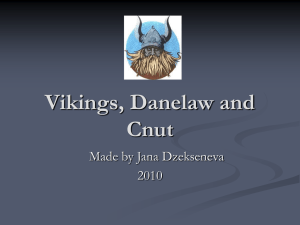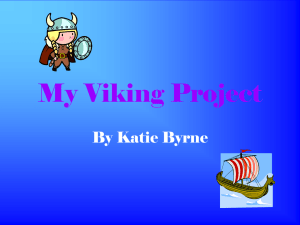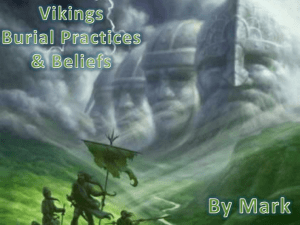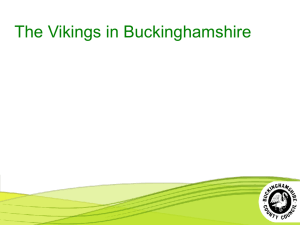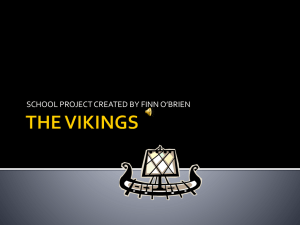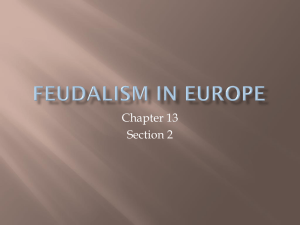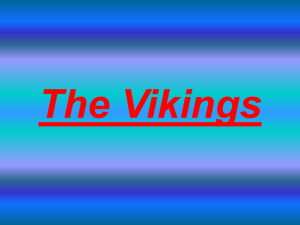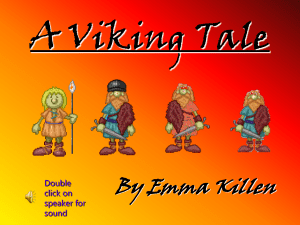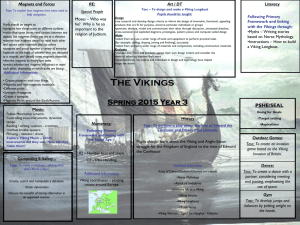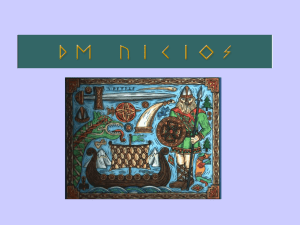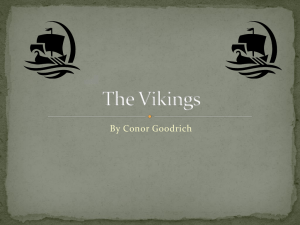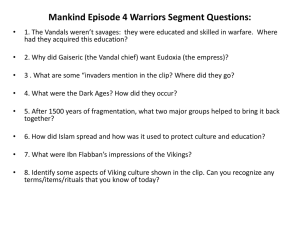Year 8 Humanities - sarahkingmedievaleurope
advertisement
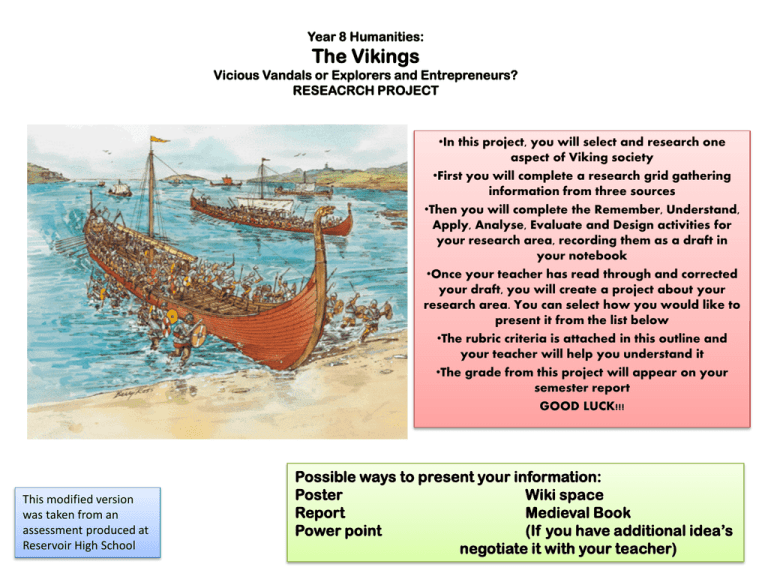
Year 8 Humanities: The Vikings Vicious Vandals or Explorers and Entrepreneurs? RESEACRCH PROJECT •In this project, you will select and research one aspect of Viking society •First you will complete a research grid gathering information from three sources •Then you will complete the Remember, Understand, Apply, Analyse, Evaluate and Design activities for your research area, recording them as a draft in your notebook •Once your teacher has read through and corrected your draft, you will create a project about your research area. You can select how you would like to present it from the list below •The rubric criteria is attached in this outline and your teacher will help you understand it •The grade from this project will appear on your semester report GOOD LUCK!!! This modified version was taken from an assessment produced at Reservoir High School Possible ways to present your information: Poster Wiki space Report Medieval Book Power point (If you have additional idea’s negotiate it with your teacher) Remember Understand Apply Analyse Evaluate Design Who were the Vikings? Where did the Vikings come from? Where does the word Viking come from? Explain why ships were so important to the Vikings. Create a timeline of the significant events in Viking exploration Create a T CHART writing 3 reasons why Vikings were considered bloodthirsty vandals and on the other side, 3 reasons why some see them as more than vandals Using the image provided at the back of this booklet write down 7 questions you would like to know about it. Remember to use the 3 levels of historical analysis Draw either a Viking male or female. Label the pieces of their clothing and the jewellery they would have worn Community life, Vikings at home and family life Use a flow diagram to explain the structure of Viking society (Jarls, karls and thralls) Why do you think Viking children did not go to school? How did they learn the history of their people or learn the skills they needed to grow up? Imagine you are a Viking living in the town of Jorvik. The circle below represents a day. Fill in the circle with what you think would happen during a busy day in Viking times. Now compare it to your life and the things you did today. Imagine you are a Viking chief giving a feast. Create an invitation which includes information about the entertainment you are providing and a list of food and drink your guests will enjoy In your won words describe a Viking “Things”. How is it similar to how we make laws today? Use a Venn diagram to help you demonstrate this Imagine you are a teenager captured in Europe by Viking raiders and taken back to a Viking homeland. Write a diary entry to explain and describe what you see and experience during your first day there. Beliefs and stories Explain how the way Christmas is celebrated today as a mix of Christian and pagan traditions. What was the responsibility of the following Viking Gods, Odin, Thor, Loki, Freya and Balder. Which of these Gods would be associated with the following events: A sudden thunderstorm An earthquake A magical spell involving Runes Create a Facebook page (on paper) or wiki-space for Thor (ask your teacher for a A4 guide for the Facebook page or guidelines for the wiki space) Make sure you include as much information as possible about Thor’s powers, where he lives, his family etc. Research what a “saga” was in Viking times and why this form of story telling was so popular. How did the Vikings pass stories on before they were written down. What was a skaid? Using a Venn diagram compare the Pagan Viking beliefs about deaths with Christian of Muslim beliefs. For example both Pagan and Christians mark burial sites but they do so using different methods. What were they? Write your own Norse myth. Remember to include some of the Gods and the Hammer of Thor. Giants, Gods and Creation Vikings at Sea: Trade and Exploration Remember Understand Apply Analyse Evaluate Design What was a Longship? Explain why its design made the Longship a good landing craft. How did trading and transport ships differ from Longships? Imagine you are a Viking on a Longship. Using a Y chart write dot points about what it would look like, sound/smell and Plan a Viking voyage. How was the ship protected? What stores did the crew need to survive a voyage from Denmark to England. Write a “voyage preparation letter” (like a school camp letter). It should include information about the trip and what to pack Draw a Venn diagram to compare the similarities and differences between modern navigation and Viking navigation. Ask your teacher for a copy of Humanities Alive. Look at page 28 and 29. Draw up a comic strip about Leif Eriksson using the information in “Greenland Gossip” Design your own Viking ship and annotate it. Remember to include your own design dragon head and what type of wood you have used. Draw, label and explain the weapons and armour the Vikings used in battle. Write your own name as a Runic message. Then write a paragraph explaining runic language and how runestones were used. A Vikings settled in lands they brought with them their customs and language. In two paragraphs describe how Norse language has influenced the English language. Imagine you are an escaped English ruler who has escaped a Viking raid. Write a letter to a friend describing what you saw when the Vikings attacked. feel like. Viking Raiders: Going Berserk What was the Danegeld? How did Viking berserkers behave in Battle? Why were Viking boats an effective means of transportation for raiders? Y Why did some monasteries like Lindisfarne have “treasure for the Vikings to steal”? Find some pictures of the Lindisfarne monastery and include them in your work Image for: Who were the Vikings: Evaluate PLEASE NOT: WIKIPEDIA AND ANSWERS.COM WILL NOT BE CONSIDERED AS AN ACCEPTABLE SOURCE IN YOUR RESEARCH GRID!!!! HIGH (3MARKS) H MEDIUM (2MARKS) M LOW (1MARK) 1. Historical/ Geographical Knowledge You have included a range of specific and accurate information related to your topic You have included some specific and accurate information related to your topic There are errors in your information and it is not very specific 2. Explanation and conclusions You have shown understanding through using accurate explanations and examples related to the topic and drawn conclusions You have shown understanding of information by paraphrasing it and attempted to draw conclusions from it You have shown understanding by paraphrasing information you have collected but have not drawn your own conclusions 3. Use of Evidence In your report you have used and referred to at least one primary and at least two secondary sources You have used or referred to secondary or primary sources Your work tells the story of what happened and uses names and dates as evidence 4. Synthesis of information You have used evidence to describe, explain and tell a story You have used some of your evidence to describe, explain and tell a story You have used a secondary source to provide an explanation, description or tell a story 5. Research Skills and Referencing You have developed useful research questions and used suitable planning tools You have included all bibliographical information in you research grid You have developed some research questions and attempted to use planning tools. You have written down the authors and titles of the sources you have used You have shown little research questions and shown little or no planning tools. You have written down the names of the sources you have used 6. Expression, Punctuation, Spelling There are no obvious errors in you spelling, grammar and expression You work has some errors in spelling, punctuation and grammar There are many errors in your spelling, expression and punctuation L NS (0)
